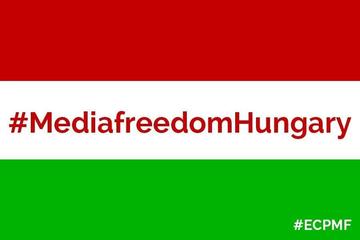
ECPMF action on 14 April calls Hungary’s Prime Minister Viktor Orban to investigate press freedom violations and defend journalists’ right to cover the refugee crisis
Originally published by ECPMF
Hungary’s Prime Minister Viktor Orban is under fire, with protest letters from ECPMF being delivered to his embassies and consulates across Europe on 14 April. ECPMF letter calls on him to investigate press freedom violations and defend journalists’ right to cover the refugee crisis. The restrictions targeting journalists include banning journalists from entering refugee camps, and a memo to employees of the Hungary public service broadcaster that they should not show pictures of refugee children.
The letter to embassies cites the incident at Röszke-Horgos on the Serbian-Hungarian border in September 2015 when Hungarian police attacked and imprisoned journalists and camera crews from Serbia, Slovakia and Australia. They were covering an attempt by hundreds of refugees to get through the border fence, which was briefly opened before riot police with water cannons moved in to break up the crowd.
Fact-finding mission
ECPMF led a fact-finding mission to establish what happened, and to offer solidarity and legal support to the reporters and camera operators. ECPMF Board Members Balazs Nagy Navarro and Ljlijana Smailović took statements, gathered footage and presented their findings to the Leipzig Media Freedom Conference.
One of those arrested, Warren Richardson, told the fact-finders that he was trying to rescue a young refugee girl from the crush of people when he was assaulted by a TEK anti-terrorism police officer: "He pushed me to the ground. I went down and on the ground I stretched for my camera. He started to kick me on the back of my head. He probably kicked me on the back of the head three or four times. When I turned around I said: ‘I am no threat to you I am a journalist there is no reasons to do what you are doing.’ I said it very clearly in English: ‘I am no threat to you, there is no need for you to be kicking me, can you please stop.’ He looked me in the face, I am still photographing him. His mate came, he looked at him, winked at his mate and just kicked me on the head again."
Warren Richardson has since won a prize for World Press Photo of the year . His winning picture, shot secretly at night without a flashbulb, shows a refugee passing a baby through the barbed wire at the Hungarian frontier. He told the fact-finding mission how he was assaulted and detained by police with Timea Beck, a colleague from Slovakia.
When ECPMF protested about this treatment of journalists to General Károly Papp, Head of Hungarian National Police Forces and to Péter Szijjártó, Minister of Foreign Trade and Foreign Affairs, the reply, received six weeks later from Sándor Gömbös, Police Major General Police Chief Advisor Head of Cabinet Office, refers to written answers to questions from MPs on the parliament website, with a web link that does not work.
He also advises: "The person whose rights or legal interests have been violated by a police action can present a complaint to the police body responsible for the action. The complaint is judged within an administrative official procedure and finally the police action can be reassessed by the court."
Now Europe’s media freedom community is appealing directly to the Prime Minister. Viktor Orban has made it clear, in his speech on Hungary’s National Day March 15th, that he is anti-refugee and anti-EU. So it is no surprise that he tries to prevent journalists from getting close to the refugees in order to present their side of the story.
Orban: “A muzzle is a muzzle”
"Ladies and Gentlemen, Europe is not free, because freedom begins with speaking the truth. In Europe today it is forbidden to speak the truth. A muzzle is a muzzle – even if it is made of silk. It is forbidden to say that today we are not witnessing the arrival of refugees, but a Europe being threatened by mass migration.“
If we want to halt this mass migration first we must curb Brussels. The main danger to Europe’s future does not come from those who want to come here but from Brussels fanatical internationalism. ... We will not import into Hungary crime, terrorism, homophobia and synagogue burning anti-semitism. There shall be no urban districts beyond the reach of the law, there shall be no mass disorder, no immigrant riots here and there shall be no gangs hunting down our women and daughters." Read the full speech at the Hungarian government press website .
Our reply to Viktor Orban is clear: with protest action in twelve capitals, a letter in the mailbox of every single embassy in Europe and a social media storm, the media freedom community demands justice for the journalists who were wrongly detained and assaulted, and respect for their freedom to report all aspects of the migration story.
To support the campaign, ECPMF invites to share the action, to tweet photo and retweet info about the campaign, spread the word by publishing the letter on your homepage or your social media account, using the hashtag #MediafreedomHungary
This publication has been produced within the project European Centre for Press and Media Freedom, co-funded by the European Commission. The contents of this publication are the sole responsibility of Osservatorio Balcani e Caucaso and its partners and can in no way be taken to reflect the views of the European Union. The project's page

 ECPMF action for press freedom in Hungary
ECPMF action for press freedom in Hungary




 All the contents on the Osservatorio Balcani e Caucaso website are distributed with a
All the contents on the Osservatorio Balcani e Caucaso website are distributed with a 